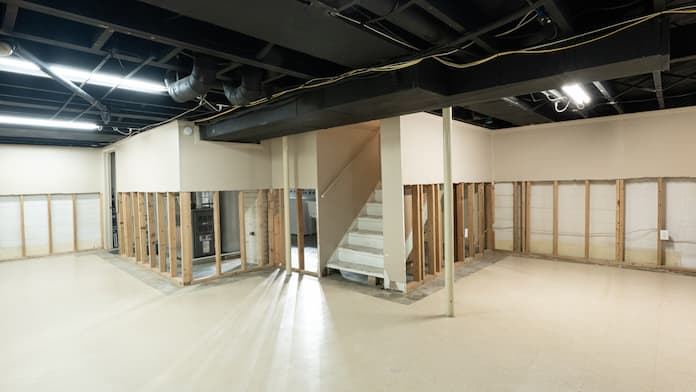How Much Does Basement Waterproofing Cost in 2024?
Dealing with a damp, musty basement? The hidden costs of water damage, from mold to structural issues, can add up quickly. However, the upfront cost of waterproofing your basement might seem high. Let’s find out how it can save you in the long run and why it’s an investment you can’t afford to skip.
Basement waterproofing can cost you anywhere from $2,000 to $7,000, on average. With minor repairs, you may only need to pay around $600 to $1,000. However, the final project cost depends on factors like basement size, location, labor, and waterproofing method.
In this article, we will break down all the factors that can affect your total cost in detail and even share helpful money-saving tips!
What is the Average Cost for Basement Waterproofing?
- Basement size
- Geographic location
- Exterior or interior solutions
- Materials used
- Waterproofing method
- Labor
What Are the Signs You Need to Waterproof Your Basement?
You definitely don’t want to end up paying thousands later on because you delayed or skipped waterproofing your basement. If you’re unsure whether your basement needs waterproofing, look for these signs:
Finding water puddles in your basement after heavy rain or melting snow is a clear indication that water is seeping in.
Even if you don't see any mold in your basement, a persistent musty smell often indicates the presence of mildew or mold, which thrives in damp environments.
Mold can be visible on walls, ceilings, or other items in your basement, appearing in various forms and colors. It poses health risks and indicates a moisture problem.
This white, chalky residue on walls is caused by water evaporating and leaving behind salt deposits. While not harmful, it signifies that moisture is passing through the wall
Cracks can develop from the pressure of expanding and contracting soil around the foundation. These cracks can allow water to seep in, leading to further structural damage over time.
If you notice bowed or inward-curved walls in your basement, it's likely due to the pressure of water-saturated soil against the walls. This sign should not be ignored, as it can compromise the structural integrity of your home.
Old or faint watermarks on the walls or floor of your basement indicate past water seepage. To prevent it from happening again, it's best to waterproof your basement before it's too late.
If you notice rust on metallic objects like nails, support beams, screws, or appliances in your basement, it indicates high humidity levels and a moisture problem that needs to be addressed.
Since bugs thrive in dark, moist environments, a large number of insects in your basement could indicate a water issue.
When water accumulates around the exterior of your home, it can indicate poor drainage or improper slope around the foundation. This water can seep into your basement walls, leading to moisture problems inside.
What Factors Are Involved in Calculating Basement Waterproofing Costs?
Let’s look at the factors one by one that can add up to the cost of waterproofing your basement.
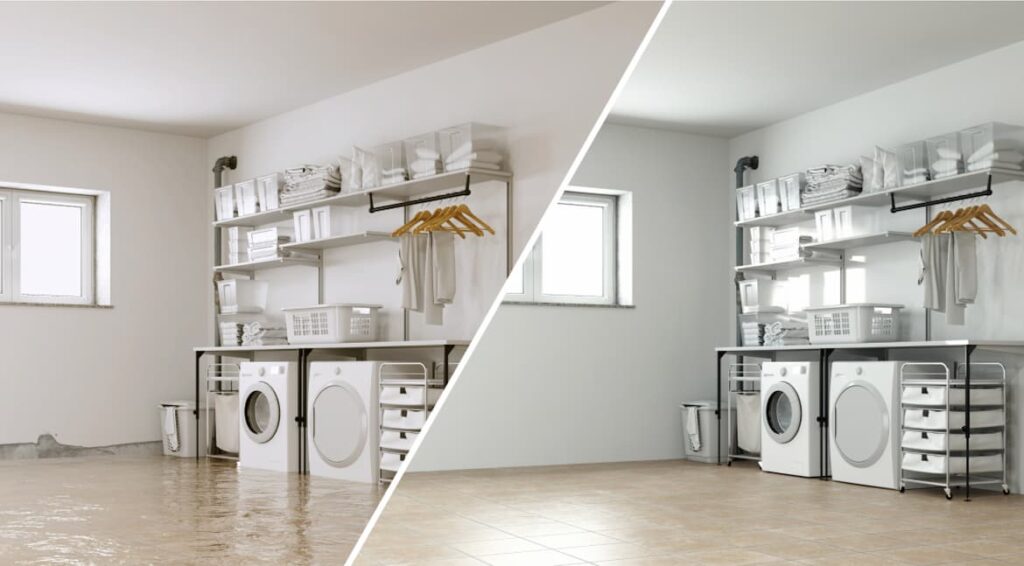
Basement Size and Layout
The bigger your basement, the more materials and labor will be needed for waterproofing.
Additionally, the layout of your basement can affect the total cost. For instance, if parts of your basement are hard to reach or require extra work, you will need to pay more.
On average, basement waterproofing ranges from $3.50 to $8 per square foot, including materials and labor.
Waterproofing experts generally charge based on square footage, especially if the job is extensive.
- Basement Size (Sq Feet) Waterproofing Cost on Average
- 500 $2,000 – $4,000
- 800 $3,800 – $6,400
- 1000 $4,500 – $8,000
- 1200 $5,840 – $9,600
- 1500 $6,250 – $12,000
- 2000 $9,500 – $22,000
Interior vs. Exterior Solutions
Whether you will have to waterproof your basement from the inside or outside can impact the cost of your project.
Interior solutions are easier to execute. On the other hand, exterior solutions may require excavating or the use of specialized machinery, equipment, and skilled labor.
As a result, exterior solutions can significantly increase the total project cost.
Labor
Labor costs can significantly affect the overall cost of waterproofing your basement. Some contractors charge on a per-hour basis while others can charge on a project basis especially if the project is smaller.
Labor fees can range from $3 to $6 per square foot. When talking about hourly rates, your contractor can charge you anywhere between $16 to $20 per hour, depending on their experience and the project’s extensiveness.
Geographic Location
The location of your home will greatly influence the final cost of basement waterproofing.
In areas with a low cost of living, labor and material costs will be lower.
Furthermore, in regions with a lot of rainfall and high humidity levels, waterproofing costs can be higher.
Due to these conditions, waterproofing can be in high demand, causing contractors to charge more. While these higher charges may seem unreasonable, the work will be more challenging and extensive than in drier areas.
Type of Sealant
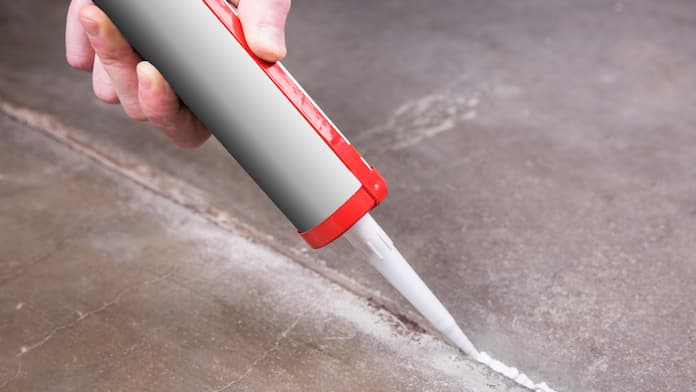
Sealants are typically applied to the foundation walls, slabs, and floors to waterproof a basement. They start as liquids and harden after application to provide waterproofing.
The type of sealant used in basement waterproofing significantly affects the overall cost due to differences in materials, labor, and application methods. Here’s a detailed breakdown:
| Sealant Type | Location | Average Cost per Square Foot |
|---|---|---|
| Acrylic Sealants | Interior | $3 - $4 |
| Silicate Sealants | Interior | $4 - $6 |
| Epoxy Sealers | Interior | $5 - $7 |
| Liquid Membranes | Exterior | $4.5 |
| Sheet Membranes | Exterior | $5 |
| Cementitious Coatings | Exterior | $4 - $6 |
| Bentonite Waterproofing | Exterior | $3 - $4 |
Interior Sealants
Interior sealants are applied to the interior walls and floors of the basement and are usually painted or sprayed directly on the concrete surfaces. Here are the three main types of interior sealants:
Acrylic Sealants
Acrylic sealants cost between $3 and $4 per square foot. They are cost-effective since they involve less labor and can even be a DIY project.
Silicate Sealants
Silicate sealers penetrate concrete and chemically react to form calcium silicate hydrate, reducing porosity and strengthening the material.
They cost $4-$6 per square foot and are best for new or unpainted concrete surfaces.
Epoxy Sealers
Epoxy injections are harder to install and can be a bit expensive, ranging from $5 to $7 per square foot.
They are used for repairing cracks, so they are only effective for small, localized issues but can add up if there are multiple cracks.
Exterior Sealants
Exterior sealants are applied to the exterior foundation walls and footings of the basement. Since they require excavation to expose the foundation walls, they are more labor-intensive and invasive. Here are the types of exterior sealants:
Liquid Membranes
According to Statista, the waterproof membrane market exceeded 29 billion U.S. dollars in 2021 and is expected to reach 40 billion U.S. dollars by 2026.
This growth shows how much homeowners are willing to invest in these membranes due to their superior properties.
Nevertheless, liquid membranes are durable but require multiple coats and professional application to prevent water from seeping through the walls into the basement. They cost about $4.50 per square foot, including materials and labor.
Sheet Membranes
Sheet membranes can be more expensive than liquid membranes due to being more labor-intensive and requiring extensive preparation.
They cost around $5 per square foot. These membranes are typically wrapped around the foundation and basement walls to prevent water from entering.
Cementitious Coatings
Cementitious coatings cost about $4 to $6 per square foot. While they provide a durable finish, they may not be as flexible as other options, making them less effective if the foundation shifts or cracks.
Bentonite Waterproofing
Bentonite is a clay-based natural sealant that fills cracks and costs around $3 to $4 per square foot. It serves as a good temporary solution but may not be as durable as other methods.
Basement Waterproofing Cost by Method
The cost of basement waterproofing varies widely depending on the method used and the extent of the work required. Here’s a breakdown of the costs by method:
| Waterproofing Method | Location | Estimated Cost |
|---|---|---|
| Sealing with Paint or Sealants | Interior | $2 - $7 per square foot |
| Sump Pump Installation | Interior | $7,000 - $18,000 |
| French Drain Installation | Interior | $85 per linear foot |
| Exterior Sealing | Exterior | $3 - $6 per square foot |
| Exterior Drains | Exterior | $25 per linear foot |
| Gutters and Downspouts | Exterior | $600 - $1,550 |
| Window Well Drains | Exterior | $500 - $2,000 per drain |
Interior Waterproofing Methods
Let’s look at the most common interior waterproofing methods one by one.
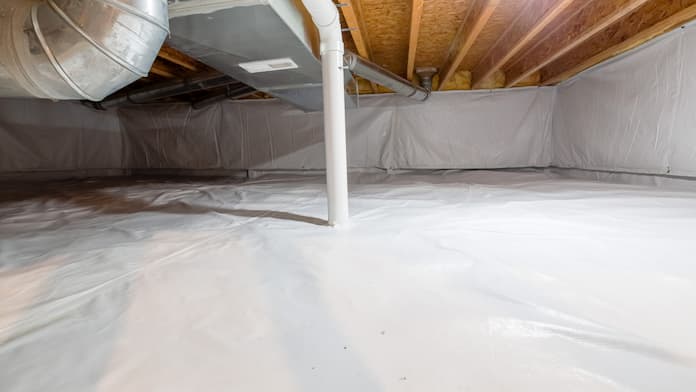
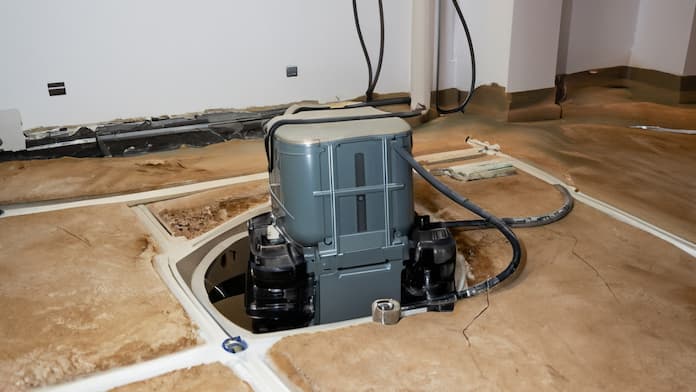

Sealing with Paint or Sealants
Sump Pump Installation
A sump pump helps drain water out of the basement and away from the foundation and home. While it provides long-term waterproofing, it only removes standing water, not seepage from the basement walls.
Therefore, it’s best to use other waterproofing solutions along with it. Installation can be expensive, costing between $7,000 and $18,000.
French Drain Installation
You can prevent flooding by installing a French drain in your basement. This system carries water from the perimeter of your basement to a sump pump or another drainage system.
It costs around $85 per linear foot, but you’ll need additional solutions to completely waterproof your basement.
Exterior Waterproofing
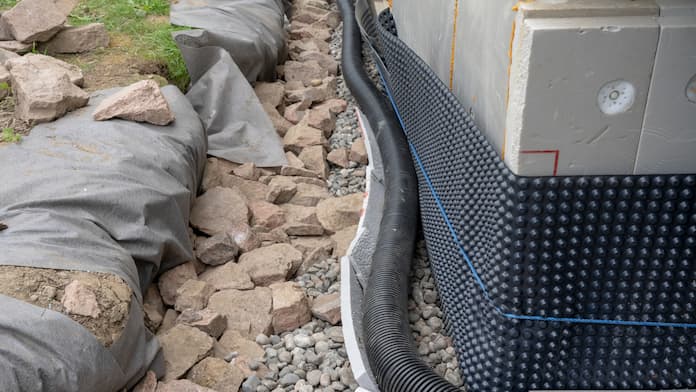
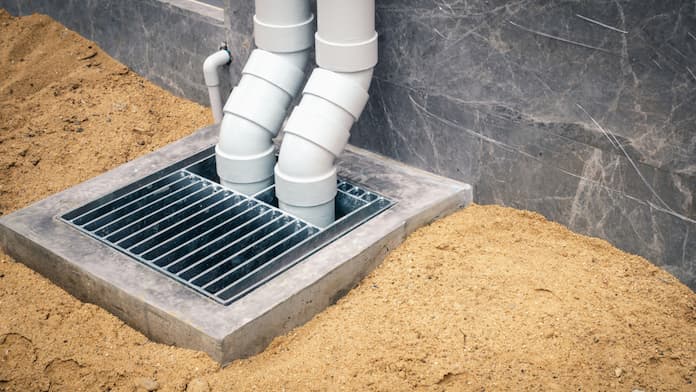
Exterior Sealing
Exterior sealants are applied to the outside of the foundation walls and footings of the basement.
As we’ve already discussed above, liquid membranes cost about $4.50 per square foot, including materials and labor.
Sheet membranes cost around $5 per square foot, cementitious coatings range from $4 to $6 per square foot, and bentonite waterproofing costs about $3 to $4 per square foot.
Exterior Drains
While interior and exterior drains function similarly, exterior drains are cheaper and easier to install, costing around $25 per linear foot.
Gutters and Downspouts
During heavy rainfall, without gutters, water can drip down the roof and collect near the foundation walls. This is why gutters and downspouts are essential. Downspouts direct water away from the foundation.
Gutter installation costs range from $600 to $1,550.
Window Well Drains
If you plan to use your basement as a living area, it’s important to have egress windows for emergency escapes. These windows have wells around them to function properly. Without proper drainage, water can pool in these wells and cause leakage.
The installation cost for window well drains ranges from $500 to $2,000 per drain.
Additional Costs and Considerations Related to Basement Waterproofing
The basement is the foundation of your home. If it has cracks and other structural problems, it can lead to leaks, causing serious issues with structure, durability, and functionality.
That's why it's so important to repair any leaks or cracks before you start waterproofing.
Fixing minor cracks might cost around $250 while repairing larger cracks could cost you over $10,000. On average, you can expect to pay around $4,530 for foundation repair.
If your home is quite old, repairing your basement can be more expensive due to potential structural issues, outdated materials, and pre-existing damage.
Additionally, you need to consider if the structure of your old home can support basement waterproofing.
For instance, homes built before the 1940s often lack support structures, making exterior waterproofing challenging. This can certainly add up to the total cost of waterproofing your basement.
Water leakage can cause mold and mildew to grow in your basement. That's why it's important to hire a specialized professional to inspect and remove mold safely. Mold removal can cost between $1,500 and $4,000.
The water table is the upper surface of the zone where the ground is fully saturated with water. The local water table level significantly impacts basement waterproofing costs.
Homes in areas with a high water table require more extensive waterproofing because they don't drain rain or groundwater well. As a result, waterproofing in these areas is more expensive than in areas with a lower water table.
The International Residential Code exterior waterproofing if you live in an area with a high water table or high precipitation.
If the slope of your yard directs water toward your foundation, it can cause basement flooding.
Landscaping contractors can excavate and backfill soil to regrade your yard, creating a new slope to direct water away from your house. This can be a significant job, costing between $1,400 and $5,200.
Exterior waterproofing, such as liquid and sheet membranes and exterior drains, requires excavation.
This job needs a professional, experienced contractor with the right knowledge and heavy machinery.
Excavation typically costs between $3,000 and $15,000, depending on the project's complexity.
While waterproofing your basement usually doesn't require permits, it's still important to check with your municipality, especially if the work involves excavation or foundation repairs.
If your basement has heavy items like appliances and furniture, you'll need to remove them to prepare for waterproofing. In fact, everything should be removed from the basement. Contractors will also charge you for removal and preparation.
Damp proofing prevents soil moisture from penetrating a building, while waterproofing keeps out both moisture and liquid water, offering a higher level of protection.
You'll need to determine if your basement requires waterproofing or damp proofing, which a professional contractor can help with.
Damp proofing is typically used for areas with minimal moisture exposure, while waterproofing is essential for areas prone to significant water exposure.
Waterproofing costs around $6.50 per square foot, whereas damp proofing costs about $4.50 per square foot.
Expert Tips to Save Money on Basement Waterproofing Cost
If you’re looking for the cheapest way to waterproof your basement, you can implement these pro tips to save money:
- You can handle simple DIY tasks like applying waterproof paint or clearing out your basement to save on labor costs.
- Regularly cleaning and maintaining gutters and downspouts prevents water from pooling around your foundation, reducing the risk of water damage and the need for costly waterproofing solutions.
- If your issue can be resolved with a minor repair, such as sealing a small crack, avoid spending on comprehensive drainage systems unless necessary.
- Address early water damage signs like musty odors, stains, or mold to prevent costly repairs.
- If you are planning other home improvement projects that involve excavation or foundation work, combine them with basement waterproofing to share labor and material costs.
- A dehumidifier can help control the humidity level in your basement, preventing mold growth and reducing the chances of water damage.
Should You DIY Your Basement Waterproofing or Hire a Professional?
Since labor fees can add up to the total cost of your basement waterproofing project, some may consider DIYing it to save money.
However, you can’t and shouldn’t completely DIY waterproofing. While you can handle small tasks like removing items in the basement, applying waterproof paint, or repairing minor leaks, the rest of the job should be handed over to a professional.
They are well-trained and have the expertise to figure out the best waterproofing method for your needs.
A professional will ensure that your project is done correctly from start to finish. Additionally, if you DIY the waterproofing, you won’t get a warranty on the products or systems from the manufacturer. Performing the job incorrectly could lead to more hassle, stress, and cost down the road.
Therefore, it’s better to leave the job to a professional. To vet the right one, ask these questions:
- Are you licensed and insured?
- Do you offer free estimates?
- What is the cost of your waterproofing services?
- How much experience does your company have?
- Can you provide references from past customers?
- What methods and products do you use for waterproofing?
- Is there a warranty for your services?
- How will you protect my home during the work?
- Are there additional costs I should know about?
Conclusion
Waterproofing your basement can range from $2,000 to $7,000, depending on factors like basement size, waterproofing method, home age, location, and labor costs. While some might consider saving money by doing it themselves, we don’t recommend it due to the potential risks involved.
Instead, hiring a professional contractor is the best approach. For this, you can use our Homebuddy tool to find a reputable local contractor for basement waterproofing near you. With over 13,200 successful projects, you can trust us to put you in good hands.
Frequently Asked Questions
- Will waterproofing my basement increase my home value?
- Yes, waterproofing your basement can increase your home’s value by preventing water damage, enhancing structural integrity, and creating usable living space. Potential buyers often find a dry, functional basement appealing, which can make your home easier to sell and potentially command a higher price.
- Is it better to waterproof a basement from the inside or outside?
- Waterproofing a basement from the outside is generally more effective and provides long-term protection by preventing water from entering in the first place. However, it is more expensive and disruptive. Interior waterproofing is less costly, and less invasive, and manages water that does enter, making it suitable for minor issues or budget constraints.
- Is basement waterproofing covered by homeowner's insurance?
- Homeowner’s insurance typically does not cover the cost of basement waterproofing as it is considered a preventative measure. However, it may cover damage caused by sudden events like burst pipes, appliance malfunctions, or sump pump failures if additional endorsements are added to the policy.
- Which is the cheapest basement waterproofing method?
- The cheapest basement waterproofing method is using interior sealants or waterproof paint, which cost $2 to $7 per square foot. This method involves applying coatings to the interior walls to prevent moisture from seeping through. However, it’s essential to note that this is typically a temporary solution and may not address the root cause of water infiltration.
